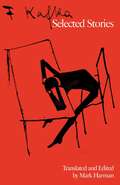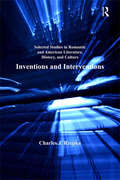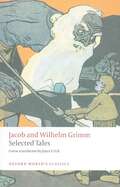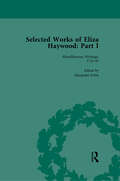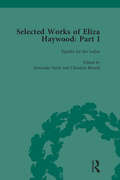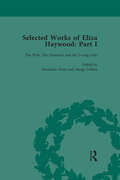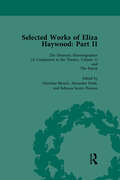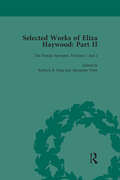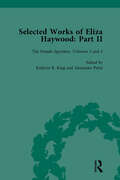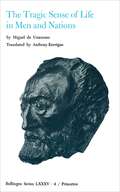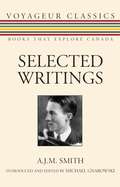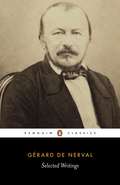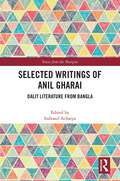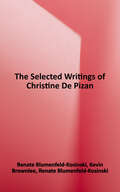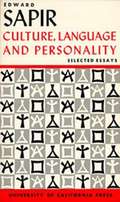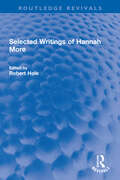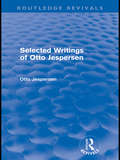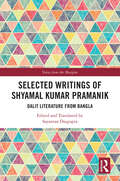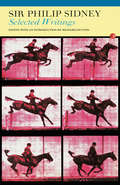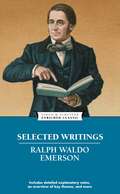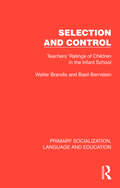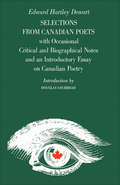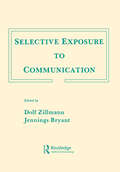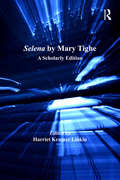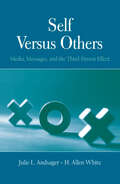- Table View
- List View
Selected Stories
by Franz KafkaA superb new translation of Kafka’s classic stories, authoritatively annotated and beautifully illustrated.Selected Stories presents new, exquisite renderings of short works by one of the indisputable masters of the form. Award-winning translator and scholar Mark Harman offers the most sensitive English rendering yet of Franz Kafka’s unique German prose—terse, witty, laden with ambiguities and double meanings. With his in-depth biographical introduction and notes illuminating the stories and placing them in context, Harman breathes new life into masterpieces that have often been misunderstood.Included are sixteen stories, arranged chronologically to convey a sense of Kafka’s artistic development. Some, like “The Judgment,” “In the Penal Colony,” “A Hunger Artist,” and “The Transformation” (usually, though misleadingly, translated as “The Metamorphosis”), represent the pinnacle of Kafka’s achievement. Accompanying annotations highlight the wordplay and cultural allusions of the original German, pregnant with irony and humor that English readers have often missed.Although Kafka has frequently been cast as a loner, in part because of his quintessential depictions of modern alienation, he had a number of close companions. Harman draws on Kafka’s diaries, extensive correspondence, and engagement with early twentieth-century debates about Darwinism, psychoanalysis, and Zionism to construct a rich portrait of Kafka in his world. A work of both art and scholarship, Selected Stories transforms our understanding and appreciation of a singular imagination.
Selected Studies in Romantic and American Literature, History, and Culture: Inventions and Interventions
by Charles J. RzepkaGathered together for the first time, the essays in this volume were selected to give scholars ready access to important late-twentieth and early twenty-first-century contributions to scholarship on the Romantic period and twentieth-century literature and culture. Included are Charles J. Rzepka's award-winning essays on Keats's 'Chapman's Homer' sonnet and Wordsworth's 'Michael' and his critical intervention into anachronistic new historicist readings of the circumstances surrounding the composition of "Tintern Abbey." Other Romantic period essays provide innovative interpretations of De Quincey's relation to theatre and the anti-slavery movement. Genre is highlighted in Rzepka's exploration of race and region in Charlie Chan, while his interdisciplinary essay on The Wizard of Oz and the New Woman takes the reader on a journey that encompasses the Oz of L. Frank Baum and Victor Fleming as well as the professional lives of Judy Garland and Liza Minnelli. Taken together, the essays provide not only a career retrospective of an influential scholar and teacher but also a map of the innovations and controversies that have influenced literary studies from the early 1980s to the present. As Peter Manning observes in his foreword, "this collection shows that even in diverse essays the force of a curious and disciplined mind makes itself felt."
Selected Tales (Oxford World's Classics Series)
by Jacob Grimm Wilhelm Grimm Joyce CrickThe tales gathered by the Grimm brothers are at once familiar, fantastic, and frightening. They seem to belong to no time, or to some distant feudal age of fairytale imagining. Grand palaces, humble cottages, and the forest full of menace are their settings; and they are peopled by kings and princesses, witches and robbers, millers and golden birds, stepmothers and talking frogs. <P><p> Regarded from their inception either as simple nursery stories or as raw material for the folklorist, the tales were in fact compositions, collected from literate tellers and shaped into a distinctive kind of literature. This new translation mirrors the apparent artlessness of the Grimms, and fully represents the range of less well-known fables, morality tales, and comic stories as well as the classic tales. It takes the stories back to their roots in German Romanticism and includes variant stories and tales that were deemed unsuitable for children. In her fascinating Introduction, Joyce Crick explores their origins, and their literary evolution at the hands of the Grimms.
Selected Works of Eliza Haywood, Part I Vol 1
by Alex Pettit Patrick Spedding Margo Collins Jerry Beasley Christine Blouch Kathryn KingThis text reprints selected non-fictional works by Haywood, with particular attention to the journalism, criticism, and "conduct and advice" material. Here, Haywood explicates and defends ideas on gender and culture that she develops obliquely elsewhere.
Selected Works of Eliza Haywood, Part I Vol 2
by Patrick Spedding Kathryn King Alex Pettit Margo Collins Jerry Beasley Christine BlouchThis text reprints selected non-fictional works by Haywood, with particular attention to the journalism, criticism, and "conduct and advice" material. Here, Haywood explicates and defends ideas on gender and culture that she develops obliquely elsewhere.
Selected Works of Eliza Haywood, Part I Vol 3
by Patrick Spedding Kathryn King Alex Pettit Margo Collins Jerry Beasley Christine BlouchThis text reprints selected non-fictional works by Haywood, with particular attention to the journalism, criticism, and "conduct and advice" material. Here, Haywood explicates and defends ideas on gender and culture that she develops obliquely elsewhere.
Selected Works of Eliza Haywood, Part II Vol 1
by Alex PettitThis text reprints selected non-fictional works by Haywood, with particular attention to the journalism, criticism, and "conduct and advice" material. Here, Haywood explicates and defends ideas on gender and culture that she develops obliquely elsewhere.
Selected Works of Eliza Haywood, Part II Vol 2
by Alex PettitThis text reprints selected non-fictional works by Haywood, with particular attention to the journalism, criticism, and "conduct and advice" material. Here, Haywood explicates and defends ideas on gender and culture that she develops obliquely elsewhere.
Selected Works of Eliza Haywood, Part II Vol 3
by Alex PettitThis text reprints selected non-fictional works by Haywood, with particular attention to the journalism, criticism, and "conduct and advice" material. Here, Haywood explicates and defends ideas on gender and culture that she develops obliquely elsewhere.
Selected Works of Miguel de Unamuno, Volume 4: The Tragic Sense of Life in Men and Nations (Selected Works of Miguel de Unamuno #1)
by Miguel de UnamunoThe acknowledged masterpiece of Unamuno expresses the anguish of modern man as he is caught up in the struggle between the dictates of reason and the demands of his own heart.
Selected Writings
by Michael Gnarowski A.J.M. SmithArthur James Marshall Smith prize-winning poet, essayist, influential anthologist, and critic died in 1980. His last book, The Classic Shade: Selected Poems, on which Selected Writings is based, stands as his final intention in the world of literature.To this long out of print book the editor has added original material by Smith in which he defined and advanced modernism in Canadian writing. This edition also includes annotation, an extended introduction, and a bibliography.
Selected Writings
by Gerard de NervalPoet, visionary, short-story writer and autobiographer, Gérard de Nerval (1808-1855) explored the uncertain borderlines between dream and reality, irony and madness, autobiography and fiction with his groundbreaking writings. This comprehensive selection of his works includes 'Aurélia', the memoir of his madness; the haunting novella of love and memory 'Sylvie' (considered to be a masterpiece by Proust); the hermetic sonnets of 'The Chimeras'; as well as Nerval's experimental fictions and selections from his correspondence, which demonstrate his lucid awareness of how nineteenth-century psychiatry consigned his fertile imagination to the status of mental illness. Together these pieces confirm Nerval's place as a pioneering modernist, a precursor of the French Symbolists and a vital model for such writers as Marcel Proust, André Breton, Antonin Artaud and Michel Leiris.
Selected Writings of Anil Gharai: Dalit Literature from Bangla (Voices from the Margins)
by Indranil AcharyaAnil Gharai is arguably one of the most significant authors of Bangla Dalit literature. His works deal with the stark everyday realities of people on the margins and the complex interplay of domination and subjugation in these spaces. This volume of English translations of some of his most celebrated works seeks to introduce his writings to a new readership in India and abroad. In his works, Gharai explored caste-based and gender-based oppression in the rural areas of coastal Bengal. His protagonists are from remote spaces, from the Dalit community or the indigenous communities—men and women who work and live in extremely exploitative circumstances and whose lives are depicted by Gharai with great care and detail. His novels, short stories and poems, translated in this volume, give voice to the unrepresented and offer a critique of the oppressive caste and class hierarchies and traditions in eastern India. He also focuses on the replication of patriarchal mores within Dalit society and culture. This volume includes critical essays on Anil Gharai and his long interview to reflect on his position in the alternative literary canon of Bangla Dalit literature. Part of the Voices from the Margins series, this critical edition seeks to visibilise the less visible literary texts and traditions. It will be of interest to those scholars engaged in contemporary Indian/South Asian literary cultures, comparative literature, modern Indian literature, minority studies, Dalit studies and gender studies. It will also be useful to students and researchers of social sciences and humanities.
Selected Writings of Christine De Pizan (Critical Editions)
by Christine De PizanThis Norton Critical Edition presents selections from eighteen of Christine's major works in fresh, contemporary translations.? Each text is fully annotated and is accompanied by an introduction placing it in the context of Christine's oeuvre and tracing the literary developments and the historical situation of the period.? The Book of Fortune's Transformation and The Book of the City of Ladies include manuscript illuminations. "Criticism" collects seven important interpretations of the literary and historical aspects of Christine's work, by Jacqueline Cerquiglini, Beatrice Gottlieb, Renate Blumenfeld-Kosinski, Sheila Delany, Patricia A. Phillippy, Joel Blanchard, and Kevin Brownlee.? A Selected Bibliography is included.
Selected Writings of Edward Sapir in Language, Culture and Personality
by Edward Sapir David G. MandelbaumThe interplay of culture and personality was a field where many of the essays of Edward Sapir have become classics in the social sciences. The nine contributions brought together in this volume well show the distinction and lasting quality of Sapir's work. They include "Culture, Genuine and Spurious," "The Meaning of Religion," "Language," "Cultural Anthropology and Psychiatry," and "The Statue of Linguistics as a Science."
Selected Writings of Hannah More (Routledge Revivals)
by Robert HoleFirst published in 1996, Selected Writings of Hannah More brings together some of More’s most powerful work, illustrating her views on the proper role of women in all areas of society. Hannah More was a member of the London literary scene and is known for her morally restrictive and politically reactionary views, confronting the arguments of radicals and feminists alike. The book explores a number of More’s key works and includes a selection of her Letters from London in the 1770s, reflecting on the state of society. Also examined are several of More’s poems and short stories. Selected Writings of Hannah More will appeal to those with an interest in social, cultural, and literary history.
Selected Writings of Otto Jespersen (Routledge Revivals)
by Otto JespersenThis volume, first published in 1960 to commemorate the one hundredth birthday of Jespersen, collects together as many of his writings as possible in order to allow students of the English language, or indeed of language in general, to read those shorter papers which have hitherto escaped their notice. The layout of the book largely follows the nature of the subjects dealt with: English grammar, phonetics, history of English, language teaching, language in general, international language and miscellaneous papers.
Selected Writings of Shyamal Kumar Pramanik: Dalit Literature from Bangla (Voices from the Margins)
by Sayantan DasguptaShyamal Kumar Pramanik is one of the most powerful writers of the Bangla Dalit literary movement. His evocative fictional world throws into relief the lives of the downtrodden in in contemporary India. This volume brings his fiction to a new readership by presenting English translations of a selection of his most powerful stories. This book is part of the Voices from the Margins series, which seeks to enhance the visibility of literary texts and traditions from various Indian languages and also to bring Dalit literature to the center stage. Pramanik focuses extensively on lives and lifestyles of the people in the Sundarbans, the largest mangrove forest in the world and an ecologically fragile zone. Drawn from personal experience, many of these stories paint in vivid colors the deprivations that define life in this part of the world. His fiction highlights the workings of caste.. The translations in this anthology are buttressed by an interview with the writer which includes his reflections on his life, society, and his writings, opening up new possibilities of understanding his work in its larger social context. The book also creates an academic framework within which Pramanik’s fiction can be read and critically analyzed. This critical edition will be of interest to students and researchers of comparative literature, South Asian literature and culture, modern Indian literature, Dalit studies, culture, history, and sociology.
Selected Writings: Selected Writings
by Sir Philip SidneyFirst published in 2003. Routledge is an imprint of Taylor & Francis, an informa company.
Selected Writings: Words Of Good Counsel On The Choice And Use Of Books Selected From The Writings Of Ten Famous Authors (Enriched Classics)
by Ralph Waldo EmersonAn essential collection of the most noteworthy essays and poems of Ralph Waldo Emerson, a leading architect of the Transcendentalist movement, which championed self-reliance, individualism, and personal potential. THIS ENRICHED CLASSIC EDITION INCLUDES: A concise introduction that gives the reader important background information A chronology of the author's life and work A timeline of significant events that provides the book's historical context An outline of key themes to guide the reader's own interpretations Detailed explanatory notes Critical analysis and modern perspectives on the work Discussion questions to promote lively classroom and book group interaction A list of recommended related books and films to broaden the reader's experience Simon & Schuster Enriched Classics offer readers affordable editions of great works of literature enhanced by helpful notes and insightful commentary. The scholarship provided in Enriched Classics enables readers to appreciate, understand, and enjoy the world's finest books to their full potential.
Selection and Control: Teachers' Ratings of Children in the Infant School (Primary Socialization, Language and Education)
by Basil Bernstein Walter BrandisOriginally published in 1974, Selection and Control: Teachers' Ratings of Children in the Infant School consists of an analysis of teachers’ ratings of children in a middle-class and in a working-class area at the end of their first year and the end of second year of life in the infant school. Presented in two parts, Part One is highly technical as it sets out in some detail the logic of the statistical description. Part Two gives one interpretation of the findings as these might throw light upon differences in the patterns of the teachers’ judgments in the middle-class and working-class area. The results of the maternal interview given in the Appendix show very clearly major class differences in the reported preparation of the child for the current educational experience of the infant school. Today it can be read in its historical context.
Selections from Canadian Poets: With Occasional Critical and Biographical Notes and an Introductory Essay on Canadian Poetry
by Douglas Lochhead Edward DewartSelections from Canadian Poets set an important precedent when it was published in 1864. It was the first anthology of native Canadian poetry and was compiled, as Edward Hartlet Dewart explained, in order to 'rescue from oblivion some of the floating pieces of Canadian authorship worthy of preservation in a more permanent form ...' This anthology, like any other, reflects the tastes of the anthologist and the tenor of the times. Pre-confederation poets had deeply felt ties with other countries from which developed a shared concern for what Douglas Lochhead terms in his introduction the 'now' and the 'place,' often described in terms of the 'past' and the 'other place,' which embraced a still larger loyalty – religious, political, philosophical, and above all nationalistic. Dewart was widely commended by critics of his attention for its endeavour to come to grips with the influences of other literatures (mainly English) and for its realization that so-called 'colonialism' was a major shaping force of Canadian poetry. On the first page of his essay Dewart states that: A national literature is an essential element in the formation of national character. These words, as well as his perceptive appraisal of the problems of Canadian literary endeavours, still apply today and make this reprint timely and pertinent.
Selective Exposure To Communication (Routledge Communication Series)
by Dolf Zillmann and Jennings BryantFirst published in 1985. Research into what is usually referred to as mass communication has concentrated on the societal impact of the media. The ways in which these media influence people and affect their behavior have been at issue. For the most part, undesirable effects were pondered and documented. Only a few desirable effects received similar attention and scrutiny. The research preoccupation with impact has been so pronounced that, comparatively speaking, next to no attention has been paid to questions such as why people enjoy whatever they elect to watch or hear, and more fundamentally, why they elect to watch or hear, in the first place, whatever it is that they elect to watch or hear. Without a symposium on research into selective exposure to informative and entertaining messages nor a publication that brought together the recent research in this area, this volume was put together in an effort to end this dilemma and to put selective-exposure research on the map as a significant research venture.
Selena by Mary Tighe: A Scholarly Edition
by Harriet Kramer LinkinMary Tighe's unpublished novel Selena is one of the great unknown treasures of British Romanticism. Completed in 1803, this brilliant, compulsively readable, beautifully written, and psychologically astute courtship novel is finally available in a scholarly edition that reveals Mary Tighe to have been as talented a fiction writer as she was a poet. The history of this amazing work's long journey from manuscript to print is only one of the stories Harriet Kramer Linkin recounts in this scrupulously annotated edition based on the only known copy of the manuscript, currently part of the National Library of Ireland's holdings. Linkin's introduction situates the novel in its historical context, draws attention to significant aspects of the plots and characters, and makes a strong case for Selena's importance for understanding the history of the novel, fiction by women, Anglo-Irish fiction, silver-fork novels, and the Romantic period. Explanatory notes explain obscure references and contexts, identify allusions to other writers, and provide translations of any non-English or archaic words. Selena itself is a revelation in its frank treatment of the darker aspects of Tighe's world, including parents who mistreat, cheat, or fail their children and spouses who commit adultery or betray one another emotionally. At the same time, it is magnificent in its stunning and moving portrayals of romantic love, of the possibility and importance of female friendship, of the difficult necessity of choosing sense over sensibility, and of the need for women and men to choose self-enhancing vocations. This extraordinary novel is destined to open up new ways of thinking by scholars of the Romantic era and the history of the novel.
Self Versus Others: Media, Messages, and the Third-Person Effect (Routledge Communication Series)
by Julie L. Andsager H. Allen WhiteSelf Versus Others explores the third-person effect and its role in media as a means of persuasion. This scholarly work synthesizes more than two decades of research on the third-person effect, the process in which individuals do not perceive themselves to be impacted by particular messages—such as persuaded to engage in risky behaviors or encouraged to be violent—but they believe others will be. Authors Julie L. Andsager and H. Allen White focus their analysis specifically on the role of media and media messages, and assert that the third-person effect functions as a means of persuasion. They explore the underlying concepts and connections this effect shares with established theories of persuasion and mediated communication. The only volume to date focusing on the topic, Self Versus Others demonstrates the significant impact persuasion has on public opinion, behavior, and policy. As such, understanding the means through which persuasion can be accomplished thereby provides a powerful tool. Timely and succinct, this book:*provides thorough synthesis of third-person effect literature;*argues that systematic versus heuristic processing underlies third-person perceptions; and*conceptually links third-person effects with co-orientation. Intended for communication scholars with an interest in persuasion, as well as those in key areas including mass communication, health communication, and political communication, this book is also appropriate for advanced courses in persuasion, communication theory, and campaigns.
